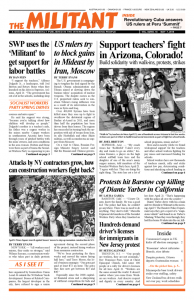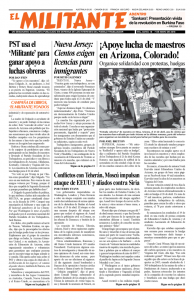The remake of TV comedy “Roseanne,” coming 21 years after the last series ended, has incurred the wrath of liberal commentators and critics. The reason for their anger? The lead character, like the show’s creator Roseanne Barr, voted for President Donald Trump. The clamor about the series says a lot more about the desperation of liberals trying to drive Trump from office than it does about the show.
It airs on ABC-TV Tuesdays at 8 p.m. EDT and is available online.
Megan Garber, writing in The Atlantic magazine, praises the earlier show, but complains that the new series fails to portray U.S. politics in “systematic crisis” — as if that should be the criteria for a successful situation comedy.
Actually, it does show the “systematic crisis” facing working people today, but that isn’t what Garber is talking about.
Linda Holmes, host of NPR’s “Pop Culture Happy Hour” race-baits the main characters, dismissing the show because she says it “treats politics as an emotional issue for white people.”
What the show actually does is present a working-class family grappling with economic, social and political questions that resonate with millions of working people of all skin colors in each storyline. One of Barr’s on-screen adult daughters has had to move back in with her parents. There are scenes about rejected credit card payments. Barr and her on-screen husband, played by John Goodman, are unable to afford medicine and trade painkillers with each other. One of the grandkids is Black, a grandson sometimes goes to school wearing nail polish. Another daughter works as a waitress, struggling to make ends meet and considers boosting her income by becoming a surrogate mother.
Roxanne Gay grumbled in the New York Times, “This fictional character and the show’s very real creator are further normalizing Trump and his warped, harmful political ideologies.” Despite describing the new series first two episodes as “excellent,” Gay is so indignant about Barr’s political views that she refuses to watch another episode. She says this act of resistance is “a small line to draw, but it’s a start.”
“What’s most disturbing about the new ‘Roseanne’ is how the network takes a populist movement that at its root and head is racist and tries to cleanse it,” complains TV critic Jeff Jarvis. In his eyes anything other than a hateful, bigoted character would not accurately portray a Trump voter.
Millions of workers, many who previously voted for Obama, voted for Trump because they rejected what had been done to them by successive Democratic and Republican administrations. Angry at the never-ending wars and the social, moral and economic crisis ravaging working people, they were attracted to a candidate promising to “drain the swamp” in Washington and jump-start jobs. Trump’s popularity is in fact growing.
A headline in Elle magazine falsely claims, “The New Roseanne Ignores the Very Real Racism of Many White Working-Class Families.” Desperate to make the allegations of racism stick, some critics point to an exchange between Barr and on-screen husband Dan Conner during the new series. Dan wakes up after sleeping through the evening’s TV shows and says, “We missed all the shows about Black and Asian families.” Barr’s character replies, “They’re just like us! There, now you’re all caught up.”
Barr’s comments merely point out the common crisis facing working people of all skin colors today.
Contrary to the Elle headline, more working people today than ever before are unwilling to accept racist assaults. The Black-led mass movement that tore down Jim Crow segregation had a lasting impact on the outlook and actions of millions of workers, both Black and Caucasian. One reflection of this is the widespread outrage in recent weeks towards the cop killings of Stephon Clark, Saheed Vassell and Diante Yarber, all Black.
The critics’ reaction to the new “Roseanne” is a reflection of the fact that many of them deeply despise and fear the millions of “deplorable” workers who elected Trump. They sense deeper working-class battles to come.
But the large audience for tuning in suggest their hysterical reviews haven’t discouraged too many people from watching the show. I recommend it.

